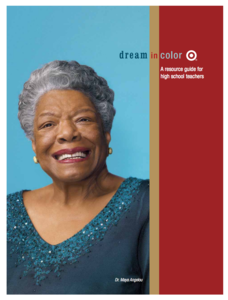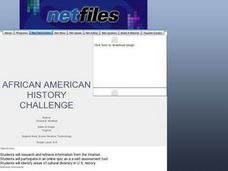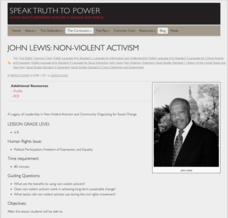American Institute of Physics
When Computers Wore Skirts: Katherine Johnson, Christine Darden, and the “West Computers”
Did you know that people, known as computers, performed the complex calculations that are now done by electronic computers? Three of these human computers, Katherine Johnson, Christine Darden, and Melba Roy Mouton are featured in a...
National Woman's History Museum
Fannie Lou Hamer and Social Activism
Not all heroes wear capes. An impactful lesson focuses on the life and activism of Fannie Lou Hamer during the civil rights movement. Scholars read her speeches and other material, participate in group discussion, and complete a jigsaw...
K12 Reader
Civil Rights Biography: Dr. Martin Luther King, Jr.
Why do schools and government offices close one day every January to honor the birthday of Dr. Martin Luther King, Jr.? Young learners discover the achievements and lasting significance of this influential figure in American history with...
Crafting Freedom
F.E.W. Harper: Uplifted from the Shadows
Young historians discover the life of an incredible African American woman who, as an anti-slavery lecturer prior to the Civil War, defied stereotypes of what women could accomplish. Pupils explore the concept of stereotyping, read...
National Endowment for the Humanities
Frances Ellen Watkins Harper’s “Learning to Read”
Frances Ellen Watkins Harper's poem "Learning to Read" is the focus of a lesson that teaches middle schoolers how to do a close reading of a text. The lesson introduces them to a brief biography of the poet, includes a video reading, and...
Curated OER
Three-Way Match: Famous Black Americans
Pupils research famous African-Americans using an online resource. They complete a three-way matching activity.
Northern Nevada Council for the Social Studies
What Are the Origins and Influences of Rap Music?
Considered an American art form, rap has its roots in places from Jamaica to the Bronx. Using a series of readings, comprehension questions, and videos, scholars explore the history of rap and its connections to the African diaspora....
US Civil Rights Trail
Explore the Civil Rights Trail—Interactive Map
An interactive map equipped with images, text, and clickable links takes history buffs on a journey through the Civil Rights trail. Scholars discovery locations including Atlanta, Georgia, Jackson, and Mississippi as part of an...
Curated OER
Rosa Parks
Facts and transcripts of Rosa Parks are transcribed in this 9-slide PowerPoint. The slides include a brief biography, history of racism, which lead into Rosa Parks' refusal to give up her seat. What follows are slides about her feelings...
Poetry Foundation
Dream in Color - High School
Whether focusing on African American poets, Black History Month, or the poetic experience, an amazing toolkit that encourages learners to develop unique poetic voices deserves a place in your curriculum.
Curated OER
Black History Lesson Plan: Gwendolyn Brooks
Learn more about the work of Gwendolyn Brooks with a language arts lesson. Young learners read an informational passage about the acclaimed poet before attempting a shape poem of their own.
Gilder Lehrman Institute of American History
Slave Narratives: Frederick Douglass, Harriet Jacobs, and the Columbian Orator
Young historians practice in-depth, quality analysis of primary source texts in this three-lesson unit, which examines excerpts from the slave narratives of Frederick Douglass, Harriet Jacobs, and Caleb Bingham.
Atlanta History Center
Civil Disobedience and the Atlanta Student Movement
What tactics are used in civil disobedience? Learners study the conditions in Alabama that led to the establishment of the Atlanta Student Movement, as well as consider the nature and effectiveness of civil disobedience.
Curated OER
Pizza Biography
A biography writing lesson with a tasty twist! Kids create a "visual biography" in which each pizza slice represents a paragraph, and toppings represent supporting details. They learn research techniques, note-taking skills, and how to...
US House of Representatives
Objects in Time
Artifacts can be used to study people and events of the past. That's the takeaway from the fifth lesson plan in a unit study of African Americans who served in Congress. Groups select an artifact associated with a Black Congress Member...
Curated OER
Understanding King's Use of Metaphors in the
One of the most famous and well-crafted speeches of all time, Dr. Martin Luther King, Jr.'s "I Have a Dream" speech, consists of rich metaphors and rhetorical language. Using a provided graphic organizer, students analyze five quotes...
Curated OER
A 'Stone of Hope'
Kids uncover the who, what, when, where, and why regarding the dedication of the Martin Luther King National Memorial. They read the provided New York Times article and then answer each of the 10 comprehension questions.
Curated OER
African American History Challenge
Students research and retrieve information from the Internet. They participate in an online quiz. They identify areas of cultural diversity in United States history.
Scholastic
Harriet Tubman Follow the North Star
Honor Black History Month with a spotlight feature on Harriet Tubman. After learning about the path the Underground Railroad followed, scholars imagine themselves on it, and share their experience and feelings through writing.
American Institute of Physics
The Physical Sciences at Historically Black Colleges and Universities
The history of science instruction at Historically Black Colleges and Universities (HBCUs) is the focus of a lesson plan that explores the early challenges these institutions faced in accessing equipment for their labs and instructors...
Center for Civic Education
The Power of Nonviolence: The Children's March
What was the Children's Crusade and how did it impact the civil rights movement in the United States? Your young learners will learn about this incredible event through a variety of instructional activities, from reading a poem and...
Speak Truth to Power
John Lewis: Non-Violent Activism
After comparing and contrasting non-violent and violent social movements, your young historians will take a closer look at the work and influence of John Lewis on the civil rights movement. They will then choose a current social justice...
PBS
Jackie Robinson's Complicated — and Important — Legacy
Americans tend to lock their heroes in history, holding these icons to a particular event or time. Jackie Robinson is such a hero, remembered by most for becoming the first African American to play in the Major Leagues. Young historians...
Curated OER
We Have a Dream
Students work as partners to study Dr. Martin Luther King's 'I Have a Dream' speech. In this African American history lesson, students work with their cross-grade partner to study, understand, and memorize the speech. Students meet with...

























